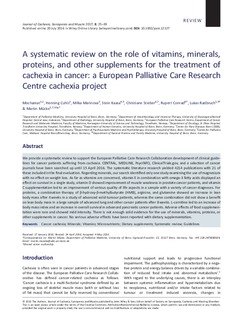| dc.contributor.author | Mochamat, * | |
| dc.contributor.author | Cuhls, Henning | |
| dc.contributor.author | Marinova, Milka | |
| dc.contributor.author | Kaasa, Stein | |
| dc.contributor.author | Stieber, Christiane | |
| dc.contributor.author | Conrad, Rupert | |
| dc.contributor.author | Radbruch, Lukas | |
| dc.contributor.author | Mucke, Martin | |
| dc.date.accessioned | 2018-02-15T15:41:40Z | |
| dc.date.available | 2018-02-15T15:41:40Z | |
| dc.date.created | 2017-08-17T12:53:55Z | |
| dc.date.issued | 2017 | |
| dc.identifier.citation | Journal of Cachexia, Sarcopenia and Muscle. 2017, 8 (1), 25-39. | nb_NO |
| dc.identifier.issn | 2190-5991 | |
| dc.identifier.uri | http://hdl.handle.net/11250/2485148 | |
| dc.description.abstract | We provide a systematic review to support the European Palliative Care Research Collaboration development of clinical guidelines for cancer patients suffering from cachexia. CENTRAL, MEDLINE, PsycINFO, ClinicalTrials.gov, and a selection of cancer journals have been searched up until 15 April 2016. The systematic literature research yielded 4214 publications with 21 of these included in the final evaluation. Regarding minerals, our search identified only one study examining the use of magnesium with no effect on weight loss. As far as vitamins are concerned, vitamin E in combination with omega-3 fatty acids displayed an effect on survival in a single study, vitamin D showed improvement of muscle weakness in prostate cancer patients, and vitamin C supplementation led to an improvement of various quality of life aspects in a sample with a variety of cancer diagnoses. For proteins, a combination therapy of β-hydroxy-β-methylbutyrate (HMB), arginine, and glutamine showed an increase in lean body mass after 4 weeks in a study of advanced solid tumour patients, whereas the same combination did not show a benefit on lean body mass in a large sample of advanced lung and other cancer patients after 8 weeks. L-carnitine led to an increase of body mass index and an increase in overall survival in advanced pancreatic cancer patients. Adverse effects of food supplementation were rare and showed mild intensity. There is not enough solid evidence for the use of minerals, vitamins, proteins, or other supplements in cancer. No serious adverse effects have been reported with dietary supplementation. | nb_NO |
| dc.language.iso | eng | nb_NO |
| dc.publisher | Wiley | nb_NO |
| dc.rights | Attribution-NonCommercial-NoDerivatives 4.0 Internasjonal | * |
| dc.rights.uri | http://creativecommons.org/licenses/by-nc-nd/4.0/deed.no | * |
| dc.title | A systematic review on the role of vitamins, minerals, proteins, and other supplements for the treatment of cachexia in cancer: a European Palliative Care Research Centre cachexia project | nb_NO |
| dc.type | Journal article | nb_NO |
| dc.type | Peer reviewed | nb_NO |
| dc.description.version | publishedVersion | nb_NO |
| dc.source.pagenumber | 25-39 | nb_NO |
| dc.source.volume | 8 | nb_NO |
| dc.source.journal | Journal of Cachexia, Sarcopenia and Muscle | nb_NO |
| dc.source.issue | 1 | nb_NO |
| dc.identifier.doi | 10.1002/jcsm.12127 | |
| dc.identifier.cristin | 1486928 | |
| dc.description.localcode | © 2016 The Authors. Journal of Cachexia, Sarcopenia and Muscle published by John Wiley & Sons Ltd on behalf of Society on Sarcopenia, Cachexia and Wasting Disorders This is an open access article under the terms of the Creative Commons Attribution-NonCommercial-NoDerivs License, which permits use and distribution in any medium, provided the original work is properly cited, the use is non-commercial and no modifications or adaptations are made. | nb_NO |
| cristin.unitcode | 194,65,15,0 | |
| cristin.unitname | Institutt for klinisk og molekylær medisin | |
| cristin.ispublished | true | |
| cristin.fulltext | original | |
| cristin.qualitycode | 1 | |

